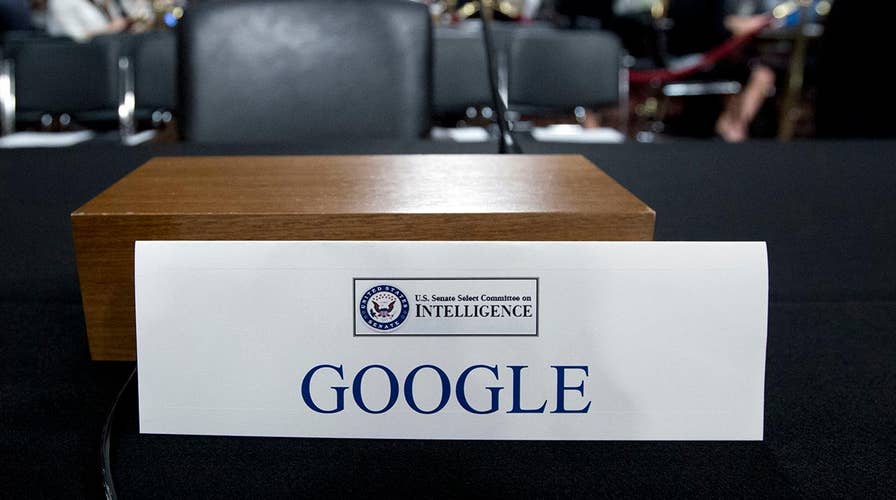Google CEO and lawmakers spar during hearing
Google CEO Sundar Pichai testified on privacy and alleged anti-conservative bias; Rep. Kevin McCarthy on his biggest takeaway from the Google hearing.
Google CEO Sundar Pichai delivered a deft and sly performance Tuesday in testimony before the House Judiciary Committee, responding evenly to sometimes ridiculous questions and managing to avoid most blows.
Pichai had a number of assists from helpful Democratic members (some of whom receive substantial campaign contributions from Google’s parent, Alphabet), who either tossed him softball questions or ran out the clock with absurd questions.
The hearing was out of central casting, with all the necessary elements – protesters being escorted out, the Monopoly character “Uncle Moneybags,” and perennial tech gadfly Alex Jones in the audience. On top of that, clueless committee members of both parties waved their cellphones and demanded answers to sometimes buffoonish questions.
Even the silly questions served Google’s interests, as the more journalists focused on the comical lack of technology savvy among members of Congress, the less they focused on Pichai’s many deliberate evasions and misdirection at the hearing.
Pichai faced a potentially fraught situation at the committee hearing.
Republican members were angry about two years of revelations of anti-conservative bias at Google in its search, advertising, employment and content. Democratic members asked hard questions about privacy breaches, tracking and the use of data.
Yet the hearing proved oddly anti-climactic, with about half the questions failing to meet their mark. The rest were skillfully parried by Pichai, with no follow-up from members.
Even the silly questions served Google’s interests, as the more journalists focused on the comical lack of technology savvy among members of Congress, the less they focused on Pichai’s many deliberate evasions and misdirection at the hearing.
Some of the key issues that arose in the hearing:
Anti-conservative discrimination in search and content – This issue came up several times during the hearing, often as a straw man for Democrats – particularly Rep. Jerrold Nadler, D-N.Y. – to raise and knock down derisively. However, several Republicans raised the issue of biased search engine results and algorithms, along with YouTube censorship. Each time, Pichai consistently denied that any such discrimination took place at Google. Advantage: Google.
Project Dragonfly – Judiciary Committee members asked Pichai about the notorious Project Dragonfly. This is the name given to an effort in which Google reportedly is developing a custom search engine for China that will both incorporate Chinese censored terms as well as feed information back to the government about Chinese searches. Again, Pichai smoothly denied that Google had any “current” plans to launch a search engine in China, though he later admitted that over 100 Google employees have worked on this and that the project is “internal” for now. In other settings, Pichai has openly spoken about wanting to have a presence in China. Pichai also mentioned that he thought access to data/search was a human rights issue, clearly implying that there was a moral imperative to bring Google search to China. Pichai’s dancing around Project Dragonfly was seen by most observers for what it was – carefully worded denials of something about to happen.
Voto Latino – Some of the most hard-hitting questions came from Rep. Jim Jordan, R-Ohio. He asked about documents revealed by Breitbart News in the summer that showed Google’s former head of multicultural marketing decrying Google’s efforts to get out the vote in the Latino communities in “key states.” This has been widely viewed as an effort to turn out Latino voters for Democratic presidential candidate Hillary Clinton in battleground states. Pichai robotically repeated his denial, saying that Google had investigated and found no evidence of such biased support. But he seemed tense about the allegation. If it were proven that Google provided one-sided support to get out the vote for Clinton – and this was not reported as an in-kind campaign contribution – it could raise campaign finance law issues.
Forced arbitration – One of the most pointed questions from the left for Pichai was from Rep. Pramila Jayapal, D-Wash.,who asked Pichai about Google’s labor practices, including its forced arbitration clauses. Pichai pivoted by explaining that Google didn’t require confidentiality as part of its arbitration contracts (it can’t, under California and many other states’ employment laws). Jayapal persisted by asking why Google was requiring forced arbitration for some types of employment claims, and asked Pichai to study the issue further. Pichai managed to dodge this bullet, for now.
Several committee members asked Pichai about Google’s data tracking practices, which he deflected by pointing to Google’s privacy checkups and reminders. No member got a satisfactory answer to questions about why it is so difficult to control the data or follow up on the privacy concerns. Perhaps this is because the system is designed by Google to be opaque. Pichai stayed on message – nothing to see here, move along.
Missing entirely from even being mentioned at the hearing was my client James Damore, whose public firing and shaming by Pichai in August 2017 led to a widely publicized class- action lawsuit against Google.
Though Damore kicked off much of the national debate on issues that have featured prominently in many of the Big Tech hearings – such as search bias, employment bias and corporate bias – House Judiciary Committee members did not ask what happened to him and those like him who were sacrificed on the altar of political correctness at Google.
Like Damore, ultimately many of the questions raised in the hearing Tuesday will be forgotten, papered over by lobbyists, political contributions and the short-lived attention spans of Congress. Google will live on, dominating search in China, India, Burma, Syria, and any place with a market and money.
Meanwhile, Big Tech continues to expand its influence in our lives. Tuesday was a good day for Google.









































